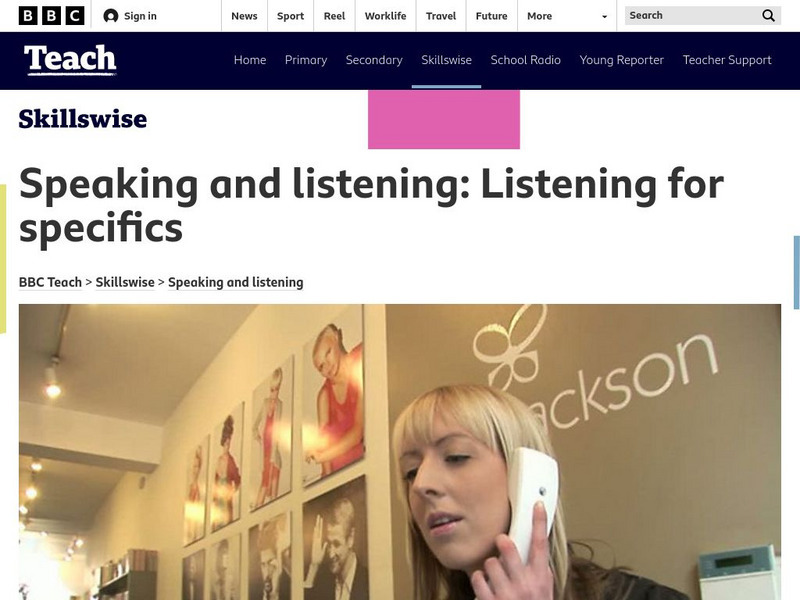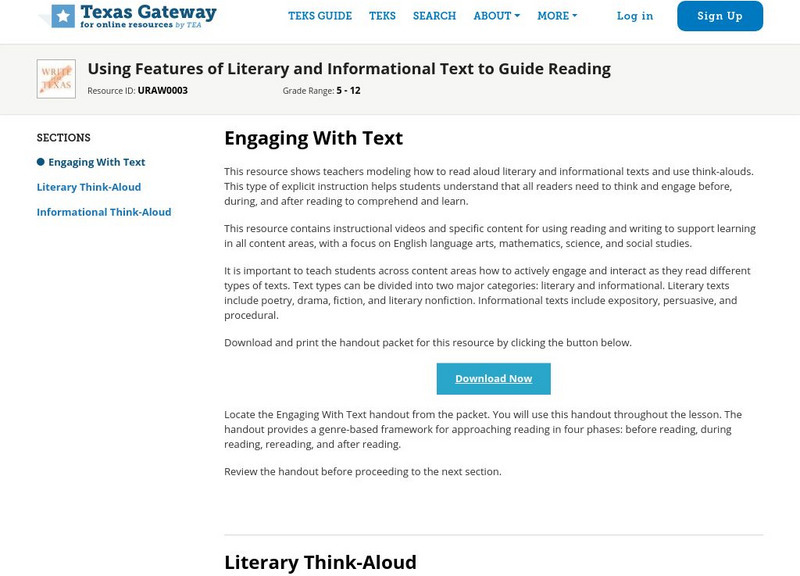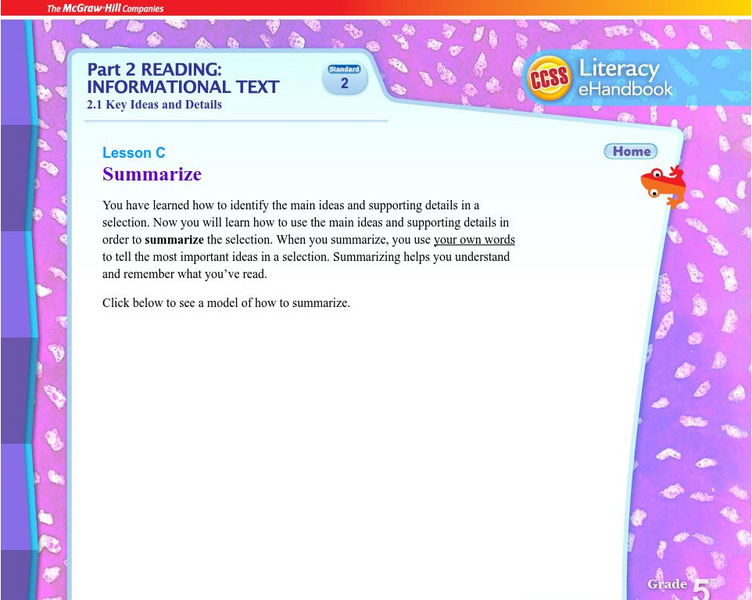CPALMS
Florida State University Cpalms: Florida Students: Integrating Information: A Titanic Challenge
Read about the sinking of the Titanic and learn to identify key ideas in multiple texts, review similarities and differences between those key ideas, and identify the difference between important and interesting key ideas. This...
Texas Education Agency
Texas Gateway: Formal Writing Across the Content Areas
This resource explores instructional practices for incorporating formal writing into English language arts, mathematics, science, and social studies instruction. CCSS.ELA-Literacy.WHST.6-8.1.d
BBC
Bbc Skillswise: Types of Listening
As part of the BBC's Skillswise unit on listening, this site focuses on the various types of listening. As learning tools, the site includes a factsheet, a worksheet, a quiz, and a game.
BBC
Bbc Skillswise: Listening for Specific Information
This tutorial presents a video, factsheets, and worksheets for learning how to listen for and understand information. It looks at how to handle different situations, e.g., arranging a delivery, asking questions about a product before...
Texas Education Agency
Texas Gateway: Using Features of Literary & Informational Text to Guide Reading
A learning module that teaches students about using text features to guide reading in three mini lessons: Engaging with Text, Literary Think-Aloud, and Informational Think-Aloud. Download a PDF with lesson plans and printable handouts...
Quia
Quia: Reading Comprehension (Reading for Facts)
There are 30 questions in this activity. Practice your reading skills with one or two short stories at a time. Read the story, then choose the answer that best answers the question.
AdLit
Ad lit.org: Develop Fluency Using Content Based Texts
Fluency is the missing piece of the reading puzzle for many older students. They can decode, but they cannot do it automatically and accurately enough to comprehend text. Here are some fluency-building activities to complement content...
Writing Fix
Writing Fix: Write About Something Real at School
In this Writers Workshop lesson plan, students look around themselves and think about their daily lives at school to find relevant writing topics.
Beacon Learning Center
Beacon Learning Center: Web Lesson: Did I Read It: Implicit vs Explicit Details
Follow Carson through a lesson in order to become a better reader of informational text. Learn the difference between implicit and explicit information. Includes multiple interactive assessments and reading activities.
Writing Fix
Writing Fix: The Wacky "I Will Not" Chalkboard
Students can use this writing idea from the book Wacky We-Search Reports by Barry Lane to demonstrate understanding in any content area. Students use the idea of writing "I will not " sentences to show their knowledge of various...
Curated OER
Mc Graw Hill: Part 2 Reading: Informational Text: Connections Within Text
Learn how information in a text can be connected through compare and contrast, cause and effect, and sequence.
Curated OER
Mc Graw Hill: Part 1: Reading Literature: Show Understanding of Text
This quick lesson from the Common Core Literacy eHandbook teaches students what questions to ask and how to answer questions to show your understanding of literature.
Curated OER
Mc Graw Hill: Part 2 Reading: Informational Text: Summarize
Learn how to summarize a text based on the main idea and supporting details you found.
Curated OER
Mc Graw Hill: Part 2 Reading: Informational Text: Summarize
Learn how to summarize a section of a text with this site.
McGraw Hill
Mc Graw Hill:informational Text: Analyze Development of Text Elements:individuals
Read an informational piece, and learn how to analyze the development of individuals in the text. Includes practice exercises.
McGraw Hill
Mc Graw Hill: Informational Text: Analyze Development of Text Elements: Events
Read an informational piece, and learn how to analyze the development of an event in the text.
Curated OER
Mc Graw Hill: Part 2 Reading: Informational Text: Show Understanding of Text
This quick activity includes a passage from an information text, and explains reading comprehension strategies to use to answer questions.
Other
Appalachian State Univ.: Journal Reprint: Internet and Blog Publishing [Pdf]
Information, ideas, and examples of how technology can be used in a Social Studies classroom. Although designed for a fourth-grade classroom, many ideas in this article are applicable and adaptable for various grade levels and other...
Other
Tooter4 Kids: Journal Writing
This site gives you a teacher's perspective on journal writing. It looks at how effective journal writing can be for your students and more.
Other
Eduscapes: Themes & Literature Circles
This site provides guidance in creating literature circles based on cross-curricular themes that will help to improve literacy. The site emphasizes both theory and practice, with lots of practical suggestions.
Grammarly
Grammarly Handbook: Headings
This page focuses on the use of headings in a paper. The layout of the headings and subheadings should be determined before beginning the paper to make it easier to read and more attractive. Most important is to be consistent with...
Other
Interacting Texts Directed Activities Related to Texts (Darts)
Want to improve your students' reading skills? This is a good place to find the types of directed activities, using a definition text, reconstruction/analysis activities, and advantages of using DARTs.
ReadWriteThink
Read Write Think: Using Narrative for Expository Text
Lesson in which students read various narrative texts which provide a context for them to learn content-area topics. Narratives allow the students to begin to understand expository texts.
ReadWriteThink
Read Write Think: Using Science Texts to Teach the Organization of Nonfiction
Contains plans for three lessons that use science textbooks to teach about the organizational features of nonfiction such as labels, captions, headings, and fonts. In addition to objectives and standards, this instructional plan contains...



















